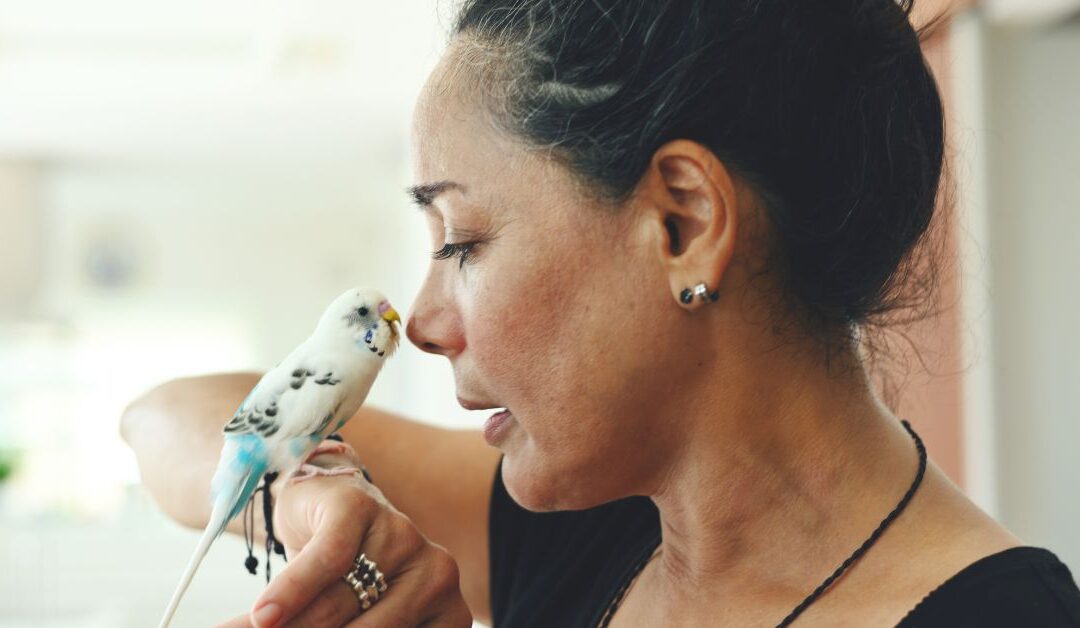Birds are some of the most intelligent, social, and expressive pets you can have. Their songs, colors, and personalities brighten any home — but caring for them requires more than a cage and a food bowl.
Proper Bird Care & Accessories help create an environment where your feathered companion can thrive both physically and emotionally. From cage setup to enrichment and social interaction, this guide will show you how to build a joyful, natural-inspired haven for your pet bird.
Building the Perfect Bird Habitat
Your bird’s cage isn’t just a home — it’s their world. The right setup promotes safety, comfort, and mental stimulation.
Choosing the Right Cage
- Size matters: A good rule of thumb — the bigger, the better. Birds need space to stretch their wings, climb, and fly short distances.
- Small birds (like finches or canaries): Minimum 18x18x24 inches.
- Medium birds (like cockatiels): Minimum 24x24x30 inches.
- Large birds (like parrots): Minimum 36x48x48 inches.
- Bar spacing: Choose narrow spacing (½ inch or less for small species) to prevent injury.
- Location: Place the cage in a bright, draft-free area where your bird can interact with family but still retreat for quiet time.
Tip: Position one side of the cage against a wall — it gives your bird a sense of security.
Cage Setup Essentials
- Perches: Offer various perch types — natural wood, rope, and textured perches help maintain healthy feet.
- Food & Water Dishes: Use stainless steel or ceramic bowls for easy cleaning and durability.
- Toys: Provide a mix of chewable, shreddable, and noise-making toys to prevent boredom.
Birds are intelligent problem-solvers. Rotate toys weekly to keep them mentally engaged and curious.
Nutrition and Feeding Tips
A healthy diet is the cornerstone of bird care.
Balanced Diet
- Pellets: Should make up 60–70% of your bird’s diet — they provide balanced nutrients.
- Seeds: Great as treats, not staples — use as training rewards.
- Fresh Fruits & Veggies: Offer daily options like leafy greens, carrots, apples (no seeds), and berries.
- Avoid: Avocado, chocolate, caffeine, and salty foods — all toxic to birds.
Hydration
Always provide clean, fresh water. Change it at least twice daily, and wash the dish regularly to prevent bacteria buildup.
Fun fact: Birds often enjoy bathing! Offer a shallow water dish or gentle misting to help them keep their feathers clean and hydrated.
Enrichment and Play — Keep Those Wings and Minds Active
Birds are naturally curious, playful, and intelligent. Without proper enrichment, they can become bored or develop behavioral issues.
Foraging Fun
Hide treats inside paper rolls or puzzle feeders to encourage natural foraging behavior. This mimics how birds find food in the wild.
Toys and Accessories
- Chew toys: Help keep beaks healthy and provide stress relief.
- Mirrors and bells: Encourage play and interaction, especially for solo birds.
- Swings and ladders: Add movement and exercise opportunities inside the cage.
Tip: Use safe, bird-friendly materials like untreated wood, natural fiber ropes, and stainless steel.
Out-of-Cage Time
If it’s safe to do so, let your bird spend supervised time outside the cage daily. This allows stretching, flying, and social interaction — vital for both body and mind.
Social Care and Bonding
Birds are deeply social creatures. Many species thrive on companionship and interaction with their human caretakers.
Communication
Talk to your bird regularly — they recognize voices and tones. Gentle speech and calm gestures help build trust.
Routine Interaction
- Spend at least 30 minutes daily interacting with your bird through play, training, or gentle petting.
- Some birds enjoy learning tricks — positive reinforcement works wonders.
- Consider introducing a companion bird if your species is known to be highly social.
Remember: Every bird has its own comfort level. Respect boundaries, and let your bird decide when to engage.
Health and Hygiene
Healthy birds are active, alert, and have smooth, shiny feathers. Prevent health problems with consistent hygiene and observation.
Cleaning Routine
- Change cage liners daily.
- Wash perches, dishes, and toys weekly with bird-safe cleaners.
- Keep cage placement away from cooking fumes or aerosols.
Signs of Illness
Watch for changes in droppings, appetite, or energy. Fluffed feathers and lethargy can signal sickness — see an avian vet promptly.
Regular grooming, clean surroundings, and balanced nutrition all contribute to your bird’s long-term well-being.
Creating a Joyful Home
Your bird’s happiness depends on connection, variety, and care. Keep their environment stimulating with:
- Bright natural light (but avoid direct heat).
- Interactive toys and perches.
- A predictable daily schedule — birds love routine!
Simple touches, like music or gentle conversation, help birds feel like part of the family.
Caring for a bird means creating a home that’s full of light, movement, and companionship. From choosing the right cage and perches to offering stimulating toys and balanced nutrition, each element plays a part in your bird’s health and happiness.
With the right Bird Care & Accessories, you can transform your space into a safe, vibrant haven where your feathered friend truly thrives.
Explore high-quality cages, perches, and interactive toys at MyFurSupply — your trusted partner for everything feathered.
Subscribe to our newsletter for expert bird-care tips, enrichment ideas, and exclusive offers.

